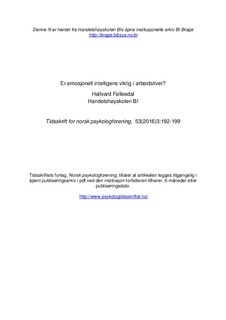| dc.description.abstract | Researchers have developed two kinds of models
of emotional intelligence (EI): The four-factor ability
model, which operationalizes EI as four mental
abilities, and mixed models of EI, which also include
personality traits and effective leadership behaviors.
The Mayer, Salovey, and Caruso Emotional
Intelligence Test (MSCEIT, Mayer, Salovey, & Caruso,
2002) is the only performance test measuring the
four-factor ability model. The scores, however, do
not predict work-related criteria after controlling for
general intelligence and the five-factor model (FFM)
of personality. One may also question the validity
of the scores and the evidence for the underlying
theory of EI. Mixed models of EI seem to measure
well-established psychological constructs (e.g.,
narrow personality traits) which may explain why
the scores predict performance after controlling
for general intelligence and FFM. In order to know
whether EI is important in the workplace, one must
first develop adequate measures of this intelligence,
and then demonstrate that it is different from, and
more important than, personality traits and general
intelligence. | nb_NO |
